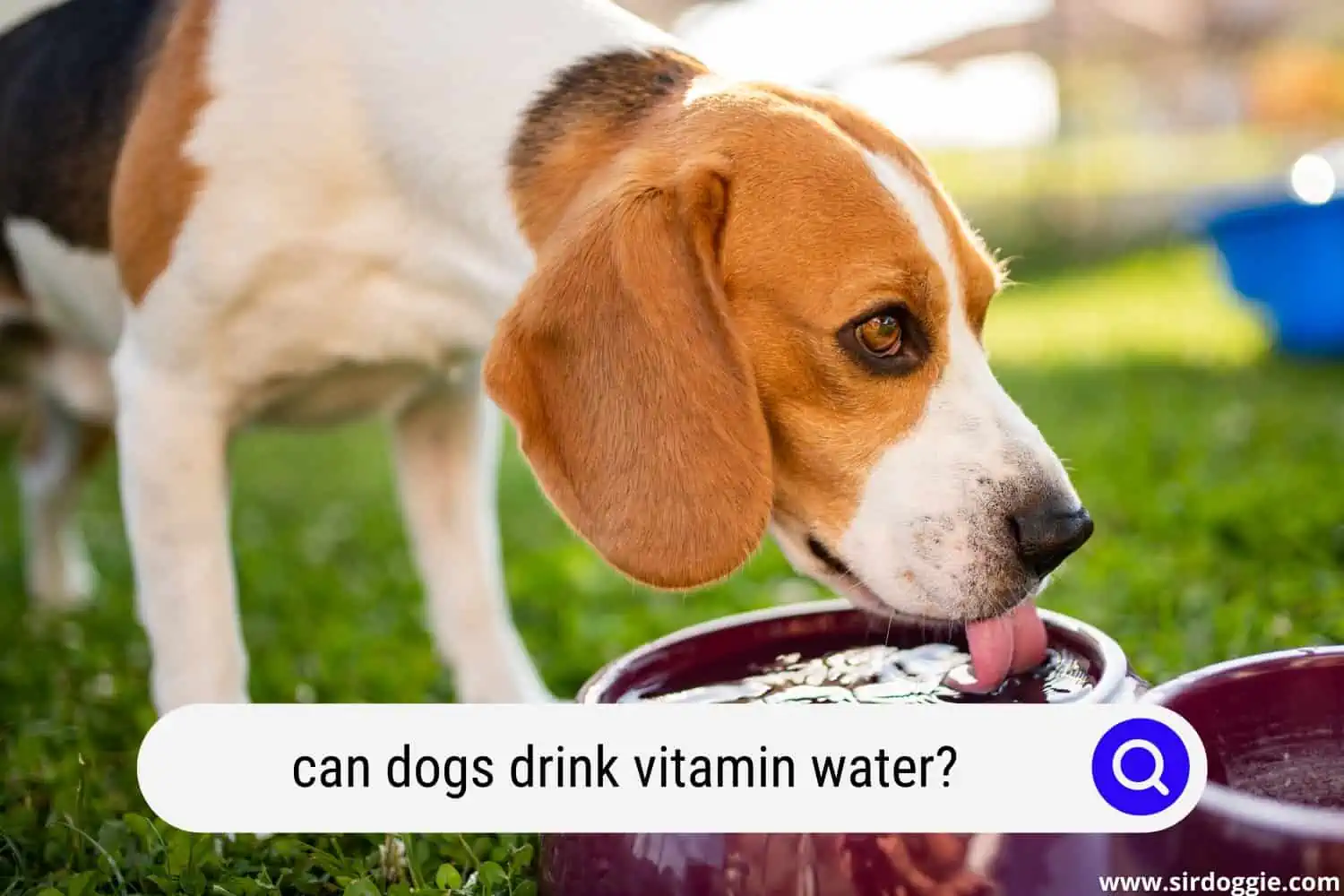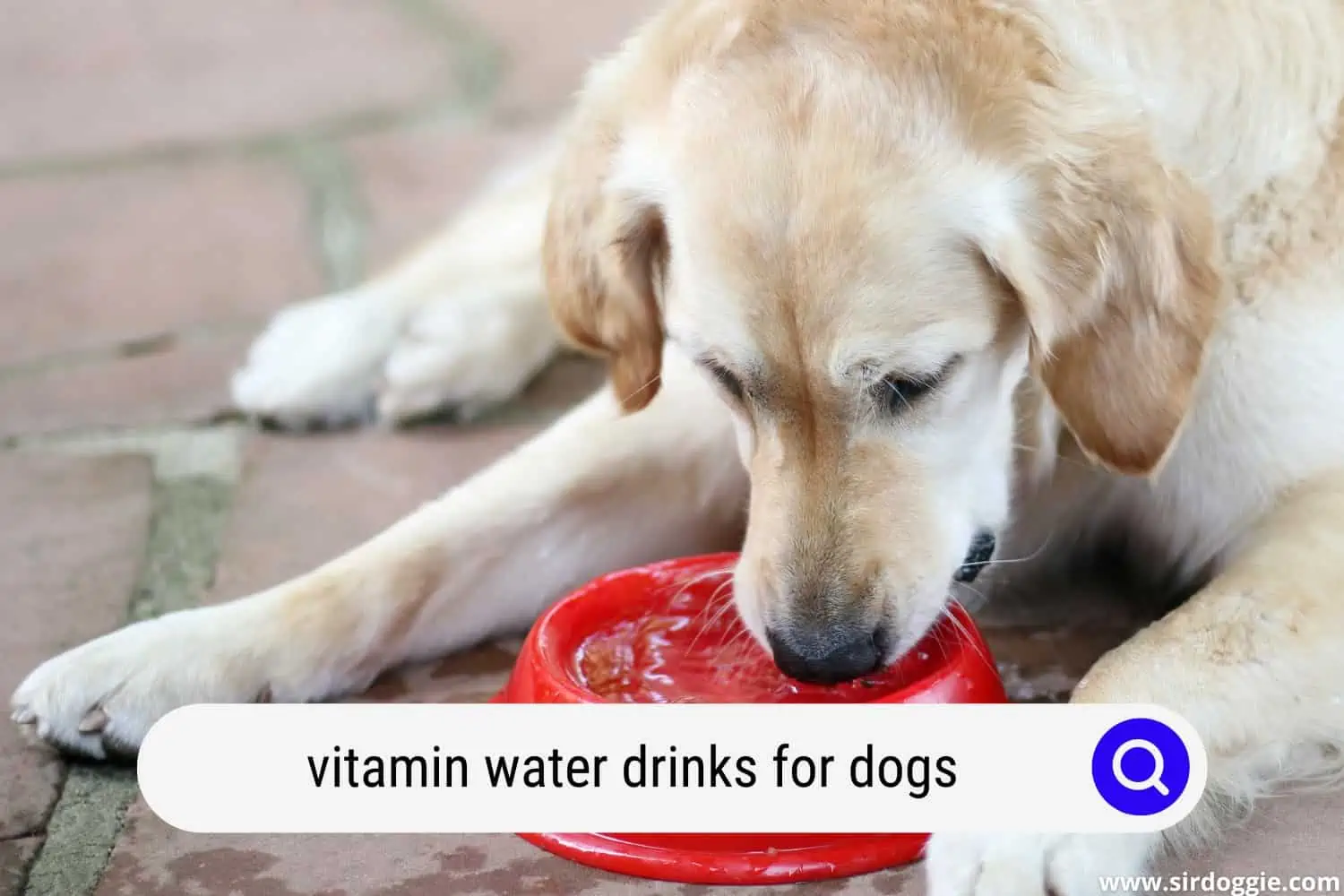Can Dogs Drink Vitamin Water?
Have you ever considered sharing your drink with your canine companions, regardless of whether it was alcoholic or non-alcoholic? Fresh drinking water, of course, is the greatest choice when it comes to keeping your pet hydrated, but can dogs also drink vitamin water?
No. Try to avoid giving vitamin water to your pups. Dogs don’t need vitamin water to maintain their overall health because it is not made according to their bodily needs. Call your veterinarian and inquire whether he/she would prescribe any supplements depending on your dog’s current level of health. Most dogs should be okay strictly on dog food and fresh water only.

Why is vitamin water not beneficial for canines?
Vitamin water for humans provides a high level of Vitamin C and other nutrients along with some dense minerals that are not good for dogs since their bodily needs are much different from ours. Additionally, the fruit juices and extracts used for creating vitamin water might be detrimental to your dog’s health.
Citrus fruit extracts can impact how a dog’s digestive tract functions, and what the components in these drinks can do to your dog’s health, in general, is still not yet fully understood, so it’s best not to take the chance. Never offer your dog vitamin water.
Can dogs have vitamin water moderately?
If your pup has a deficiency confirmed by the veterinarian that would benefit from consuming vitamin water and would make that consumption less likely to cause harm by comparison to a fully healthy dog who doesn’t need nutritional supplements, it may be safe to test a small amount and see how your dog reacts to the water. However, due to the possible digestive and other risks, it’s best to stick to simply giving your pup dog-friendly and 100% safe snacks and beverages.
Related Reading: Can Dogs Drink Propel Water?
Vitamin Water Substitutes for Dogs
Whereas vitamin water may be risky for your pup to consume, there are still other human snack options that are suitable in moderation for dogs to have without being harmed. Here are some alternatives to vitamin water for dogs:
- Give your dog some organic fruit or vegetables as an alternative to their usual dried or canned food. Carrots, tomatoes, collard greens, and pears are just a few of the nutritious foods that you can feed your pet.
- Yogurt is sometimes given to dogs as a treat by their owners. While this is okay in moderation, the majority of commercial yogurts are filled with added sugar. Look for yogurt that is minimal in sugar or sugar-free, or prepare your dog-safe yogurt at home.
- Additionally, you can try giving your pet some meat or chicken broth, although this should not be done regularly. Ensure you are using a broth that is not high in sodium, which is very common for most prepackaged broth options.
When giving your dog any human treats, avoid all types of fruit juices since they include a high concentration of vitamin C. Also be sure to avoid fruits such as grapes, which can be extremely hazardous to your dog’s health.
What Kind of Drinks Should Dogs Avoid?
Sticking to plain water is always your best choice when it comes to maintaining your dog’s health and keeping them hydrated. However, if you’re adamant about trying new things, these are the drinks that should always be avoided when it comes to giving human beverages to your pup:
Juice
The majority of juices have additional sugar added to them, as well as artificial tastes and colors, all of which are harmful to a dog’s health. Most “pure” juices are okay for a dog to consume in tiny amounts, such as allowing your dog to lick the dish after chopping some apples, but it’s strongly advised to avoid these in any large quantities. Consult your veterinarian to determine whether any applicable juices are safe for your dog to consume in small amounts, though you will likely be advised against it.
Milk
It may seem obvious that dogs (and other animals) can drink milk because they are nursed on their mother’s milk after birth; however, this is not the case at all. As canines develop and reach maturity, most dogs develop lactose intolerance. As a result, their systems have difficulty absorbing lactose and consuming an excessive amount of milk might cause diarrhea, nausea, and gastrointestinal discomfort. A tiny amount of milk is usually safe in very small amounts, but keep an eye on your pet after consuming any milk and milk-based products to see if he gets any of the problematic symptoms listed above.
Soda
Like other caffeine- and sugar-containing beverages, soda is off-limits to canines. While a little taste of your drink is unlikely to harm him, drinking anything more than a few drops or a big slurp of your soda may cause your dog’s blood sugar to rise to dangerous levels. You also run the risk of your dog being afflicted with caffeine poisoning.
Beer/Wine
This issue raises a massive red flag. Serving alcohol to dogs in the form of beer or other alcoholic beverages is not something to be laughed at as dogs are particularly sensitive to the effects of alcohol. As reported by the ASPCA’s Animal Poison Control Center, consumption can result in digestive problems, as well as impaired coordination and neurotoxicity. Other symptoms of alcohol consumption in canines can include difficulty breathing, convulsions, abnormal blood acidity, paralysis, and death.
Lemonade
Dogs can get an upset stomach due to the citric acid in lemonade. Aside from that, lemonade also typically includes a lot of sugar, which is detrimental to your dog’s health. A dog’s blood sugar levels can rise far more quickly than those of humans, resulting in both acute and long-term health issues, so be sure to keep your pup away from lemonade.
Coffee or Tea
Caffeine toxicity in dogs is a rather common occurrence. Dogs, who normally weigh less than humans (for toy, small, or medium-sized dog breeds), might have unfavorable responses to even modest quantities of caffeine since they are smaller in stature. The chemical components found in caffeine (which are also present in chocolate) are extremely toxic to dogs, so avoid letting them have any of your beverages containing such to ensure they don’t get sick.

FAQs
Is it okay for dogs to consume flavored water?
Pets may sometimes be selective about the water they drink. However, it’s advised not to encourage your pet to drink more water by providing them with flavored water. Most flavored waters contain numerous non-dog-friendly chemicals and additives, as well as sometimes even natural flavoring that may be unsafe due to the acid content (such as with fruits) Water that has been distilled, purified, bottled, and even tap water all have distinct flavors, so try a non-flavored but different type of water instead.
Which beverages are harmful to dogs?
Caffeine-containing beverages (such as coffee, tea, and other caffeinated beverages) are harmful to dogs, as discussed above. Caffeine has the potential to be lethal for canines. Coffee and tea—both the beans and the grounds—should be avoided when it comes to your pup. Ensure that your pooch does not consume any cocoa or chocolate, as well as any soft drinks or energy beverages.
Is it okay for dogs to consume electrolytes?
Electrolyte drinks can be beneficial to older, sickly, or weak dogs who need such important minerals to replace anything that may be deficient as a result of any medical conditions. For healthy dogs, occasional consumption may also not be problematic in most cases. However, most human electrolyte drinks contain far more sodium content than is appropriate for a canine, so always be sure to consult your vet before giving your dogs any electrolytes without prior medical clearance.
Is it possible for a dog to consume ginger ale?
No, it is not recommended that you give your pup ginger ale. This is because it contains a lot of sugar and artificial flavors. Aside from that, some products may be sugar-free, but they will instead include artificial sweeteners as a replacement, and these chemicals are extremely hazardous to dogs.
Is there any commercial vitamin water available specifically for dogs?
Dogs of all ages can benefit from Wolf Spring’s vitamin-enhanced water supplement by the pet nutrition firm, Wolf Spring. This vitamin water is made entirely of natural and plant-based ingredients and comes with a variety of health benefits for your furry companion. However, always consult your vet before giving vitamin water to your pup. They can recommend whether or not you should give this to your pup according to your dog’s age, size, and health status.
Related Reading: Can Dogs Eat Chocolate Pudding?

Family Dog Expert Author
Hi there! I’m Stuart, a devoted dog lover and family dog expert with over a decade of experience working with our furry companions. My passion for dogs drives me to share my knowledge and expertise, helping families build strong, loving bonds with their four-legged friends. When I’m not writing for SirDoggie, you’ll find me hiking, playing with my beautiful dog, or studying music.